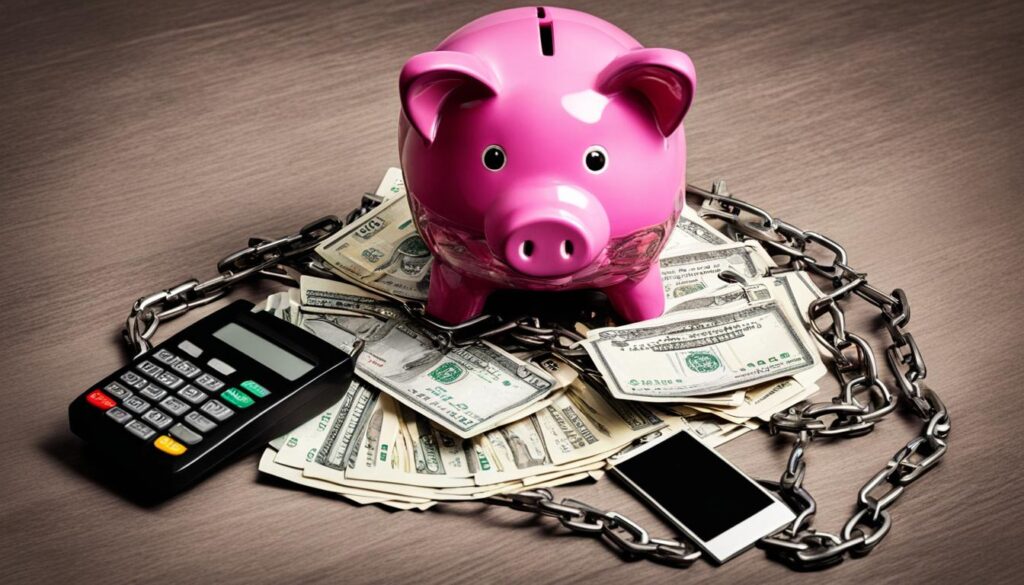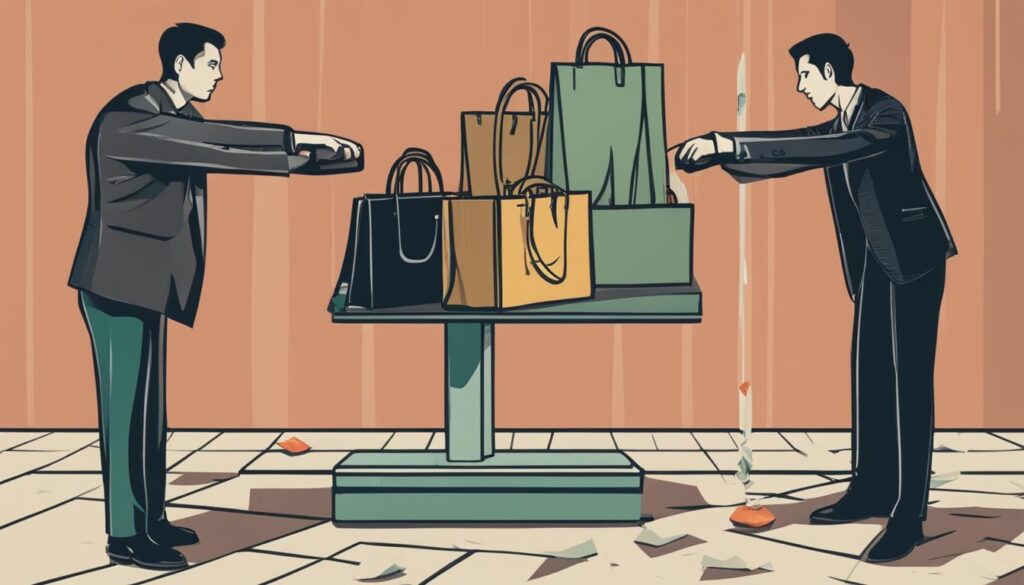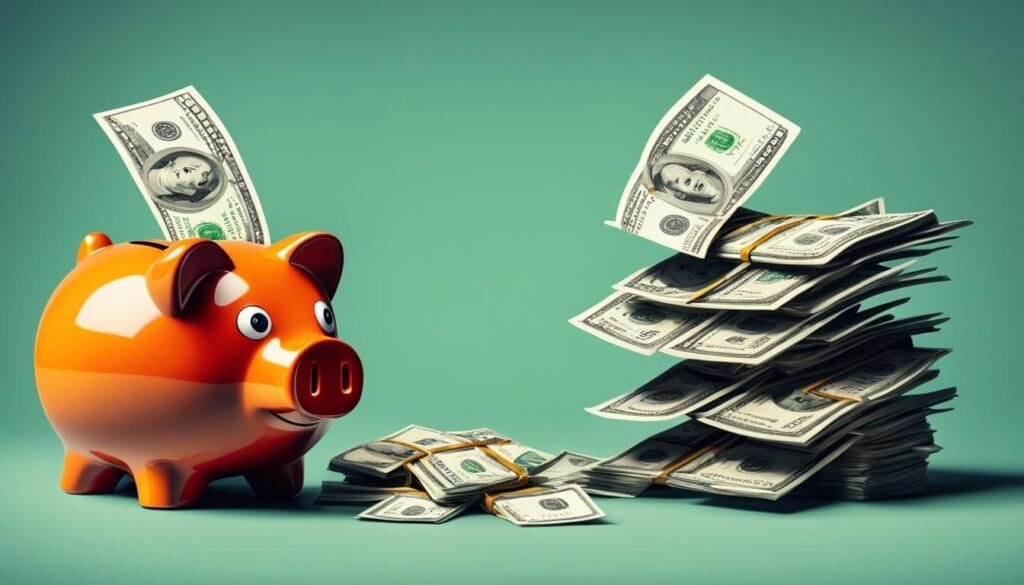Debt is a major financial burden that can hinder individuals from building wealth and living their dreams. Despite this, many people make excuses for staying in debt. In fact, 77% of Americans have some type of debt, debunking the myth that debt is normal or even beneficial. Additionally, 1 in 5 Americans have fallen deeper into debt since June 2022, indicating that staying on top of debt is a challenge. It’s important to break free from the normalization of debt and choose to be different in order to achieve financial freedom.
Key Takeaways:
- Don’t fall for the allure of “Buy One Get One Free” promotions that can lead to excessive spending and debt.
- Take control of your finances by recognizing the dangers of debt and making a commitment to prioritize financial freedom.
- Shop smart and avoid unnecessary purchases that can contribute to a cycle of debt.
- Seek insights from financial experts who can provide guidance on smart money management and debt reduction strategies.
- Remember that true wealth is built by making informed choices and being disciplined with your finances.
The Excuse of Plenty of Time
One common excuse for staying in debt is the belief that there is plenty of time to plan for a secure financial future. However, the reality is that being in debt prevents individuals from building wealth and securing their present and future. It’s crucial to take action today and prioritize financial health.
By following the proven financial strategy of the 7 Baby Steps, individuals can take control of their debt and pave the way for a stronger financial future. These steps, popularized by renowned financial expert Dave Ramsey, provide a roadmap for achieving financial freedom by addressing debt and building a solid foundation for long-term success.
- Step 1: Save an Emergency Fund – Establishing a safety net of at least $1,000 will help protect against unexpected expenses and prevent the need to rely on credit cards or loans.
- Step 2: Pay off Debt – Prioritize debt repayment by using a debt snowball or debt avalanche method, focusing on one debt at a time until they are all paid off.
- Step 3: Build a Fully Funded Emergency Fund – Increase the emergency fund to cover 3-6 months of living expenses, providing a buffer during challenging times without resorting to debt.
- Step 4: Invest for the Future – Maximize retirement contributions and explore other investment avenues to grow wealth and secure a comfortable retirement.
- Step 5: Save for College – If applicable, start saving for children’s education to alleviate the burden of student loans in the future.
- Step 6: Pay Off the House – Contribute extra funds towards mortgage payments to become completely debt-free, including owning a home outright.
- Step 7: Build Wealth and Give – Focus on long-term wealth building and giving generously to support causes close to one’s heart.
These Baby Steps provide a clear path toward financial freedom and prosperity. By following them diligently, individuals can break free from the chains of debt and embrace a brighter financial future.
Insights from Financial Experts
“Many individuals underestimate the impact that debt can have on their financial future. By making the excuse of plenty of time, they delay taking action and end up paying more in interest and missed opportunities. It’s vital to face debt head-on and start implementing the Baby Steps as soon as possible to secure a stronger financial footing.”
Benefits of Taking Action Today
By tackling debt and following the Baby Steps, individuals can experience various benefits:
- Financial Freedom: Eliminating debt allows individuals to regain control over their finances and make progress towards their goals and dreams.
- Reduced Stress: Living without debt alleviates the constant weight of financial stress, leading to better mental and emotional well-being.
- Improved Credit: Paying off debt and managing finances responsibly improves credit scores, opening doors to better loan terms and financial opportunities.
- Increased Wealth: By eliminating debt and investing for the future, individuals can grow their wealth and create a more secure financial future.
- Financial Security: Having a solid financial foundation provides peace of mind and the ability to weather unexpected financial storms.
Don’t fall into the trap of believing there is plenty of time to address debt and secure your financial future. Start today by embracing the Baby Steps and making a commitment to achieve a debt-free life.
Overcoming Income Limitations
Another common excuse for staying in debt is the belief that one does not make enough money to live debt-free. However, paying off debt is possible regardless of income level. By exploring various opportunities to increase income and making necessary spending adjustments, individuals can expedite debt repayment and achieve financial freedom.
Earning Extra Cash
One effective way to tackle debt is by earning extra cash through side hustles and additional sources of income. There are various options available:
- Driving for rideshare platforms
- Delivering food
- Selling unused items
- Asking for a raise
- Finding a higher-paying job
Engaging in these activities can provide individuals with the extra cash needed to accelerate their debt repayment.
Spending Adjustments
In addition to increasing income, making spending adjustments is a budget-friendly way to free up more money for debt repayment. Consider implementing the following strategies:
- Have a no-spend month to reduce nonessential expenses.
- Give up nonessential expenses, such as dining out or subscription services, temporarily to divert funds towards debt repayment.
These small sacrifices can have a significant impact on debt reduction and help individuals regain control over their financial situation.

| Extra Cash Opportunities | Description |
|---|---|
| Driving for rideshare platforms | Sign up as a driver for popular rideshare services like Uber or Lyft and earn money by providing transportation services to passengers. |
| Delivering food | Join food delivery platforms such as DoorDash or Grubhub, and earn extra cash by delivering meals to customers’ doorsteps. |
| Selling unused items | Declutter your home and sell items you no longer need or use through online marketplaces like eBay or Facebook Marketplace. |
| Asking for a raise | Prepare a compelling case highlighting your contributions and value to your employer, then have a conversation about a salary increase. |
| Finding a higher-paying job | Seek out job opportunities that offer higher salaries or career progression potential to boost your income over the long term. |
Sacrifices for Financial Peace
Many people believe that the sacrifices required to become debt-free are not worth it. However, making short-term sacrifices can lead to long-term financial peace and freedom from debt. It’s important to understand that these sacrifices are temporary and that the rewards of being debt-free far outweigh the temporary limitations.
Here are some examples of sacrifices that can help you achieve financial peace:
Eating at home instead of restaurants: By cooking meals at home, you can save a significant amount of money on dining out expenses. This short-term sacrifice can lead to long-term financial stability.
Forgoing expensive vacations: Instead of splurging on extravagant trips, consider exploring more budget-friendly travel options or even planning staycations. This allows you to allocate more funds toward debt repayment and achieve your long-term financial goals.
Selling high-cost items: If you have possessions that are valuable but not necessary for your daily life, consider selling them to generate extra cash to pay off debt. This sacrifice can provide immediate relief and accelerate your journey toward financial freedom.
Downsizing to a more affordable lifestyle: Evaluate your living arrangements and consider downsizing to a smaller, more budget-friendly home or apartment. This can help reduce housing costs and free up more money to tackle your debts.
Implementing these changes may be challenging, but remember that they are only temporary. The sacrifices you make now will pave the way for a brighter financial future. Once you become debt-free, you’ll have more control over your income and the freedom to make choices without the encumbrance of debt.
| Sacrifices | Short-Term Impact | Long-Term Benefits |
|---|---|---|
| Eating at home instead of restaurants | Reduced dining expenses | More savings for debt repayment and financial goals |
| Forgoing expensive vacations | Cost savings on travel expenses | Accelerated debt repayment and increased financial stability |
| Selling high-cost items | Immediate cash infusion | Reduced debt and improved financial freedom |
| Downsizing to a more affordable lifestyle | Lower housing costs | Additional funds for debt repayment and financial security |
The Power of Budgeting
Many people believe that having a budget limits their freedom. However, a budget is a powerful tool that provides control over money and allows individuals to understand and track their spending. Budgeting helps eliminate wasteful spending and makes individuals feel like they received a raise by freeing up money that was previously unaccounted for.
By creating a budget, individuals gain a clear picture of their income and expenses, enabling them to make informed financial decisions. It provides a framework for effective money management and ensures that every dollar is allocated according to priorities.
One budgeting app that simplifies the process is EveryDollar. With EveryDollar, users can easily set up and track their budget, monitor spending, and set financial goals. The app provides real-time information and enables users to make adjustments on the go, ensuring full control over their finances.
Here’s an example of a budget:
| Expense Category | Budgeted Amount | Actual Amount |
|---|---|---|
| Housing | $1,200 | $1,200 |
| Transportation | $300 | $280 |
| Groceries | $400 | $350 |
| Utilities | $200 | $180 |
| Entertainment | $100 | $80 |
A budget provides a sense of control by ensuring that expenses do not exceed income, preventing debt accumulation and promoting financial stability. It allows individuals to allocate funds for savings, emergencies, and future goals, providing peace of mind and a clear path towards financial freedom.
Don’t let the misconception that budgets restrict freedom deter you from experiencing the benefits of effective money management. Embrace the power of budgeting and take control of your financial future today.

Breaking Free from Comparison
In today’s society, it’s easy to fall into the trap of comparing ourselves to others and trying to keep up with the Joneses. We see our friends, neighbors, and even strangers on social media flaunting their extravagant lifestyle choices and material possessions, which can create a sense of inadequacy and fuel our desire to attain the same level of affluence. However, this constant comparison and pursuit of material wealth can have detrimental effects on our financial well-being, leading to unnecessary debt and financial struggles.
Instead of using individuals in debt as our role models, it’s crucial to understand that appearances can be deceiving. Many people who seem to have it all together are actually living beyond their means and grappling with debt behind closed doors. It’s important to remember that financial success is not solely determined by material possessions and external validation.
“Comparison is the thief of joy.”
Instead of trying to keep up with others, it’s essential to shift our focus towards our personal financial goals and prioritize long-term financial well-being over short-term material desires. By breaking free from the comparison trap, we can pave the way for a more fulfilling and secure financial future.
Understanding the Dangers of Comparison
Constantly comparing ourselves to others creates a never-ending cycle of dissatisfaction and consumerism. It drives us to make impulsive and often unnecessary purchases in an attempt to keep up with the perceived lifestyles of those around us. This can lead to increased credit card usage, higher debt levels, and a constant feeling of financial insecurity.
Embracing Financial Role Models
Instead of looking to individuals who are struggling with debt as role models, seek guidance from those who have successfully managed their finances and achieved financial freedom. Look to renowned financial experts such as Dave Ramsey, Suze Orman, or Warren Buffett for inspiration and guidance. These individuals have built their wealth through disciplined financial habits and strategic decision-making and can serve as valuable mentors in your own financial journey.
The Power of Contentment
“Financial peace isn’t the acquisition of stuff. It’s learning to live on less than you make, so you can give money back and have money to invest.”
It’s important to cultivate a mindset of contentment and gratitude for what we have instead of constantly craving what others possess. By focusing on the value of experiences, relationships, and personal growth rather than the accumulation of material possessions, we can achieve a greater sense of fulfillment and financial stability.
Avoid falling into the comparison trap by setting realistic financial goals based on your own values and priorities. Accept that everyone’s financial journey is unique, and it’s important to focus on your own progress rather than comparing yourself to others.

| Comparing Yourself to Others | Focusing on Your Own Financial Goals |
|---|---|
| Leads to unnecessary debt | Creates a path towards financial freedom |
| Increases spending and consumption | Promotes mindful and intentional spending |
| Causes dissatisfaction and financial insecurity | Brings contentment and financial stability |
| Puts emphasis on material possessions | Emphasizes personal growth and experiences |
Avoiding Impulse Purchases
The culture of instant gratification and buying things on credit has distorted the true meaning of affordability. If an individual cannot pay for something in cash, they cannot truly afford it, regardless of credit card promotions or buy now, pay later options. Buying items on credit only leads to more debt and additional expenses due to interest charges. It’s crucial to resist the temptation of immediate purchases and instead save up money to make purchases with cash, avoiding the burden of debt.
It’s easy to be enticed by flashy advertisements and the promise of instant gratification that comes with credit card purchases. However, it’s important to remember that these purchases may come at a high cost in the long run. Interest charges and fees can quickly accumulate, resulting in a significant financial burden. By avoiding impulsive buying and sticking to a cash-only approach, individuals can maintain control over their finances and avoid falling into debt.
Instead of giving in to the desire for instant gratification, consider adopting a more mindful approach to spending. Take the time to evaluate whether a purchase is a true necessity or simply a fleeting want. By practicing delayed gratification and saving up for desired items, individuals can ensure they can afford them without relying on credit.
The Dangers of Credit Card Debt
Credit cards can provide a convenient way to make purchases, but they can also lead to a spiral of debt if not used responsibly. The allure of “buy now, pay later” can lead to overspending and accumulating high balances that are difficult to pay off.
According to recent data, the average credit card debt in the United States is over $5,000 per individual. This debt can quickly become burdensome, especially when compounded by high interest rates, late payment fees, and other charges. Avoiding impulse purchases and using credit cards wisely can help individuals stay out of debt and maintain financial stability.
Table: The Impact of Impulse Purchases on Debt
| Potential Impulse Purchase | Amount Spent | Interest Rate | Payment Term | Total Cost (including interest) |
|---|---|---|---|---|
| New Smartphone | $1,000 | 18% | 24 months | $1,305.94 |
| Designer Handbag | $500 | 22% | 12 months | $574.84 |
| Luxury Vacation | $3,000 | 24% | 36 months | $4,599.24 |
“Every time you resist the urge to make an impulse purchase, you are one step closer to financial freedom. Prioritize your long-term financial health over short-lived instant gratification.”
In a world where instant gratification is glorified, it can be challenging to resist the temptation to make impulse purchases. However, the real cost of these purchases goes beyond the price tag. High-interest rates, mounting debt, and the burden of financial stress can have long-lasting consequences on one’s financial well-being.
By prioritizing financial stability, avoiding unnecessary purchases, and saving up for what is truly affordable, individuals can break free from the cycle of debt and achieve long-term financial success.
Is Falling into Debt from Payment Plan Options Common with Buy One Get One Free Deals?
Many people can fall into debt from payment plan options cost when they are lured by buy one get one free deals. It’s common for consumers to overlook the long-term financial impact of these deals and end up incurring unnecessary debt from the initial cost of the item and the subsequent payment plan.
Conclusion
Debt is a significant obstacle to achieving financial freedom and realizing personal goals. However, by dispelling common misconceptions about debt and taking a proactive approach to personal finances, individuals can break free from the cycle of debt and build long-term wealth. This journey requires creating and adhering to a budget, making necessary sacrifices, avoiding the comparison trap, and resisting impulse purchases.
Creating a budget is a fundamental step towards managing finances effectively. By allocating income to different expenses and savings goals, individuals gain control over their money, making it easier to reduce debt and save for the future. Making necessary sacrifices, such as cutting back on unnecessary expenses or downsizing, is an integral part of the debt repayment process. Although these adjustments may be challenging at first, the long-term benefits of being debt-free far outweigh the temporary limitations.
Another key aspect of achieving financial freedom is avoiding the comparison trap. It’s crucial to focus on personal financial goals rather than trying to keep up with others. Material possessions and appearances can be deceptive, and many individuals who appear to have it all may be burdened by debt and financial stress. Instead, prioritize long-term financial well-being and make decisions that align with your own financial situation and goals.
Lastly, resisting impulse purchases is essential in staying on track towards financial freedom. The culture of instant gratification and buying on credit has distorted the true notion of affordability. It’s vital to remember that if you can’t pay for something in cash, you can’t truly afford it. By saving money and making purchases with cash, individuals avoid accumulating more debt and the accompanying interest charges.
Achieving financial freedom may require initial sacrifices and adjustments, but the rewards are well worth the effort. By actively managing your budget, making necessary sacrifices, avoiding comparisons, and resisting impulse purchases, you can break free from the burden of debt and create a better financial future for yourself.
FAQ
Is Buy One Get One Free (BOGO) a good deal?
While BOGO promotions can seem enticing, it’s important to shop smart and consider if the items are truly needed. If the extra item will contribute to debt or go unused, it may not be a good deal in the long run.
How can I break free from debt and plan for a secure financial future?
The key is to follow the proven financial strategy of the 7 Baby Steps. Start by building an emergency fund, then focus on paying off debt and investing for the future. Taking action today is crucial for achieving long-term financial security.
What can I do if I feel like I don’t make enough money to live debt-free?
Regardless of income level, it is possible to pay off debt. Consider opportunities for earning extra cash, such as driving for rideshare platforms or delivering food. Making spending adjustments and finding ways to increase income can help expedite debt repayment.
Are the sacrifices required to become debt-free worth it?
Short-term sacrifices, like eating at home instead of restaurants or downsizing to a more affordable lifestyle, can lead to long-term financial peace. The temporary limitations are outweighed by the rewards of being debt-free and having more control over your income.
How can budgeting help with my financial situation?
Budgeting is a powerful tool that provides control over money. It eliminates wasteful spending and allows you to track your expenses. With budgeting, you can find areas to cut back on and free up more money for debt repayment, making you feel like you received a raise.
Should I compare myself to others when it comes to financial decisions?
It’s important to avoid comparing yourself to others, especially if they are in debt. Many people who appear financially successful may be struggling behind the scenes. Focus on your personal financial goals and prioritize your long-term financial well-being over short-term material desires.
Is it okay to buy things on credit for instant gratification?
It’s vital to resist the temptation of immediate purchases on credit. If you can’t pay for something in cash, you can’t truly afford it. Buying things on credit only leads to more debt and additional expenses due to interest charges. Saving up money to make cash purchases can help you avoid the burden of debt.
How can I achieve financial freedom and break free from the cycle of debt?
By adopting a proactive approach to personal finances, you can overcome debt and build long-term wealth. This requires creating and sticking to a budget, making necessary sacrifices, avoiding the comparison trap, and resisting impulse purchases. Put in the effort now and enjoy the long-term benefits of being debt-free.
Source Links
- https://www.ramseysolutions.com/debt/why-do-people-stay-in-debt
- https://www.abcactionnews.com/money/consumer/millions-of-people-are-in-more-debt-after-the-holidays-financial-experts-share-advice-on-how-to-pay-it-off
- https://www.cnbc.com/2019/12/19/how-to-stop-obsessing-over-your-debt-according-to-experts.html

